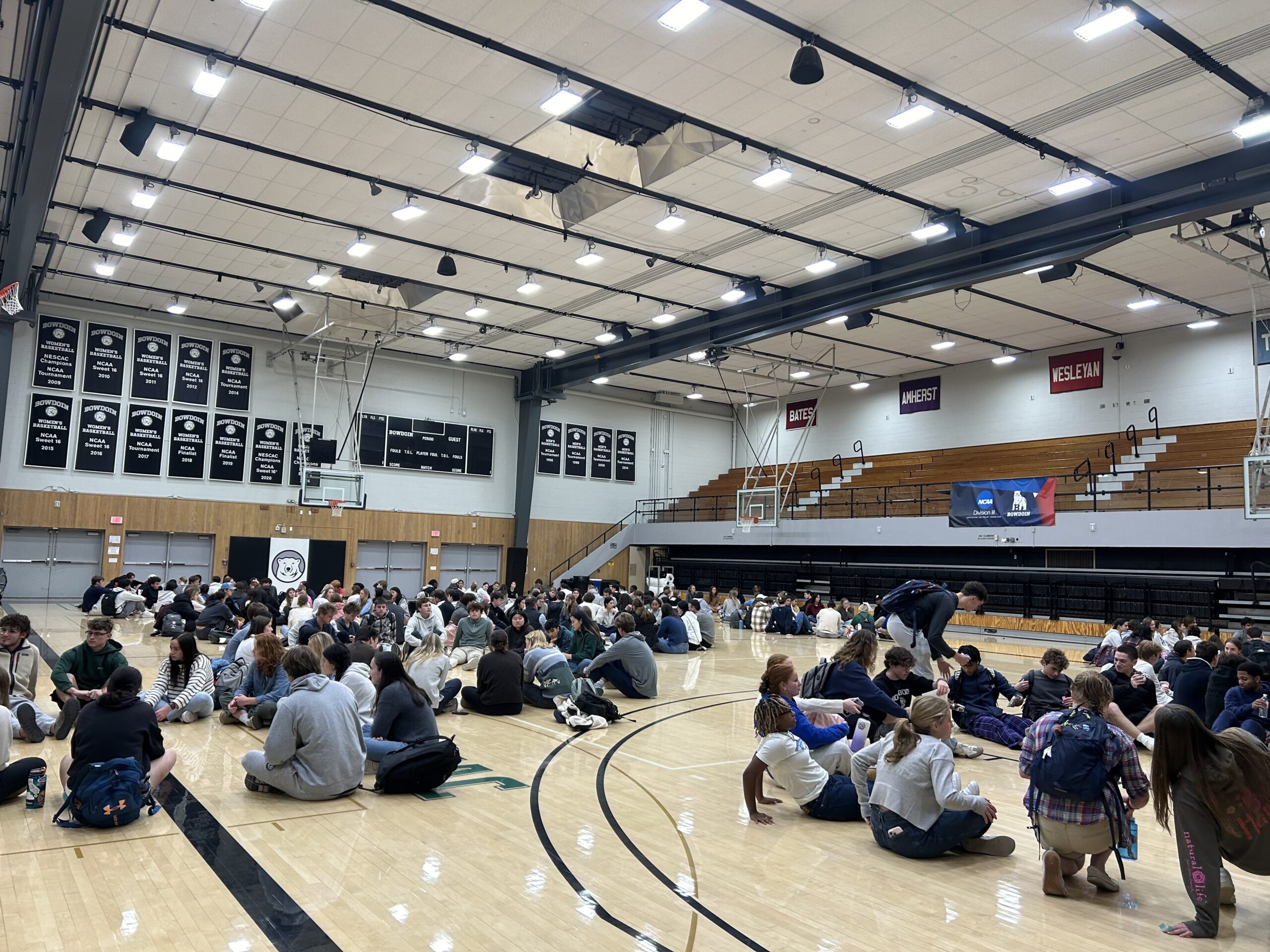AoCC No Hate November event brings teams together for meaningful discussions
November 22, 2024
 Courtsey of Bowdoin Athletics
Courtsey of Bowdoin AthleticsOn November 11, the Athletes of Color Coalition (AoCC) hosted its annual No Hate November event in Morrell Gymnasium with upwards of 250 attendees, breaking attendance records for the event from years past.
Will Onubogu ’26, vice president of external engagement for the coalition, expressed excitement about this year’s high level of participation.
“I think, ultimately, [the highlight] for me was attendance. From being an AoCC [representative] freshman year and then moving up a little bit, I think what’s really important for me and for anyone on the board is getting the engagement up,” Onubogu said.
The event opened with remarks from assistant soccer coach Andrew Banadda, a Middlebury College alum.
“[Banadda] shared a little story about his time at Middlebury as a student-athlete and basically wanted everyone to be conscious of his experience and what it’s like for athletes of color going into these conversations that we were about to have,” Anyi Sun ’26 said.
The audience split into several groups of 15 to 20 student-athletes to discuss topics surrounding race and racism in the athletic sphere at Bowdoin and beyond. According to Sun, the event nurtured a productive conversation between different athletic teams that was unique to many of the attendees.
“Typically, when you talk to another member from another team, you’re giving small talk, like, ‘Oh, the lockers are great. Yeah, the gym sucks,’” Sun said. “But having this kind of prompt from No Hate November, bringing these different athletes together and getting to know people on a deeper level … was a huge thing that people really liked.”
AoCC President JK Bradley ’25 emphasized how helpful it is to learn about how different teams approach Diversity, Equity and Inclusion (DEI) training.
“Every semester, each team has a DEI meeting,… but there’s not a lot of inner-team talking and learning from others, like learning what other teams do for their meetings or just hearing about other experiences,” Bradley said.
When formulating the event’s structure, the AoCC board decided to start discussion group conversations off with broader athletic issues instead of only focusing on Bowdoin issues for the entirety of the event.
“Doing just Bowdoin specific stuff felt really repetitive because I think you can show up to any Bowdoin event and talk out how to make Bowdoin better,” Sun said.
Some of the broader topics included the accomplishment of Los Angeles Dodgers pitcher Shohei Ohtani, the Haudenosaunee tribe that invented lacrosse wanting to be represented in the Olympics and racism in the European soccer league.
“People might think these conversations are always going to be hard or that it’s going to be blame-based,… and that could turn people away,” Onubogu said. “But I think what was done really well was that the questions were just meant to just spread awareness about, not just all the negative stuff, but also the success of Shohei Ohtani and show the success of people of color worldwide.”
The hope for all conversations was that there was not a specific structure for the athletes to follow.
“We’re meant to facilitate discussion, and the hope was that it was organic.… We didn’t want [the questions] to be like leading questions,” Onubogu said. “We wanted to allow people to get whatever they want out of it.”
The conversation revolving around Bowdoin culture was primarily focused on sportsmanship, a theme the NESCAC is encouraging schools to incorporate into their programming this year.
“With my group,… we talked about how we can address issues like unsportsmanlike conduct, not only through athletes but from spectators, towards players of color or any other members of oppressed groups,” Sun said.
Bradley emphasized her goal of bringing optimistic energy to these conversations.
“We didn’t want a DEI event to just be, ‘These are things that are happening, things that are going wrong,” Bradley said. “Hopefully [we leave] people with a message of what they can do within their team and on a little bit of a positive note.”
Sun expressed that the high turnout also equated to real engagement from the student-athletes who attended.
“Going back to texts from my teammates and hearing people come to me after the event, that meant a lot, because the way they expressed it, it didn’t seem like they felt like it was something they just had to show up to,” Sun said. “They felt like this was really meaningful.”

Comments
Before submitting a comment, please review our comment policy. Some key points from the policy: